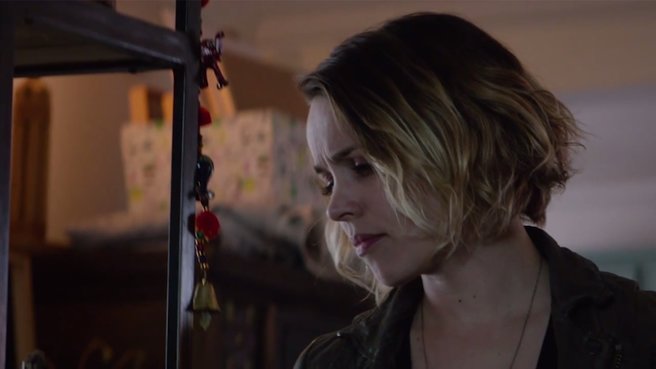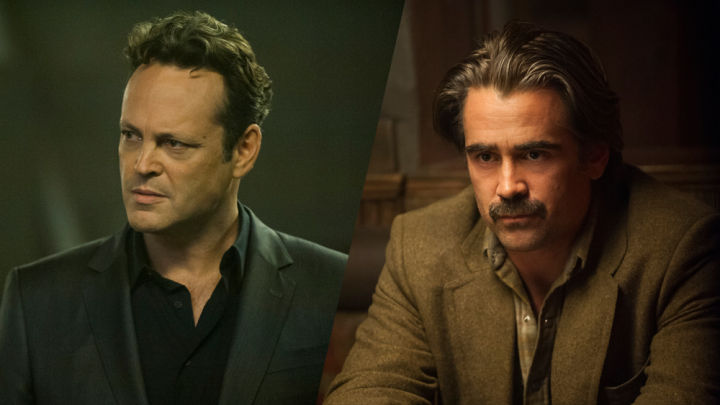Season 2 of HBO’s True Detective, titled “The Western Book Of The Dead”, doesn’t so much start with the same cold open (nor intrigue) of the first season’s pilot, nor, does it seem, with the same clarity.
Three disparate storylines intertwine here: Ray Velcoro (Colin Farrell) is a boozed-up, divorced Bad Lieutenant type who is a well-intentioned-yet-shitty father, and is in the pocket of Frank Semyon (Vince Vaughn), a mid-level gangster looking to go legitimate by securing a rail transportation system for Central California. Ani Bezzerides (Rachel McAdams) has some deep-seated anger issues boiling at the surface, which she unleashes through her tenuous relationships and dedication to her job as county sheriff; either with her nameless lover, or her distraught sister, Athena (Leven Rambin), who rebels against her own existence by working as a webcam performer. And rounding out the cast is Taylor Kitsch as Paul Woodrugh, a no-nonsense, self-medicating highway patrolman and Desert Storm veteran who seems to be suffering from PTSD, rides out top speed on his bike, and is the first to discover the MacGuffin for this season.
All paths lead to the disappearance of Ben Caspar, a city manager with dubious sexual proclivities, and which foretell the arrival of what showrunner Nic Pizzollato has promised would be the psycho-sexual corruption surrounding the development of California’s transportation system. Most of the cast shines here: Farrell plays the self-destructive, spent former hero well, and wears — and drinks — his characters morose weight in every shuffle of his feet. McAdams seems the most self-assured character, even if she is playing the rebelling daddy’s girl a bit too obviously (although little flourishes around her add up to a bit of depth to her character: in one scene she is preparing for a day at the precinct: whereas the men’s locker room shows a number of men wandering around, talking, and even joking, when it cuts to the women’s locker room, she is completely alone. Either she has no friends, or there are little to no women joining her in the fray). And Taylor Kitsch seems like an actor who has been searching for the right franchise to get his name into the zeitgeist: while this is all a bit too heavy for him (at least now), he looks damaged enough to convincingly portray a messed-up veteran cop.

The one actor who seems out of place is Vince Vaughn, who is trying desperately hard to keep the heavy dialogue (and it is heavy and heavy-handed) sounding natural. If he had been cast about 15-20 years ago to play the character, prior to his current run of tepid comedies, Semyon might be a palpable threat. Here? Here he seems like an actor acting as a character.
As it stands, this episode suffers from three issues.
- First, the time-frame is considerably disjointed; while each character is introduced, the timeframe jumps around from past to present, all while we watch the (what we discover to be lifeless) body of Ben Caspar being driven to a location. Days seem to pass between each of the events, but it is not entirely clear when exactly all of these events transpire (with Farrell, a change in hairstyle indicates his flashback. With everyone else…not so much).
- Secondly, the psychosexual dynamics are thrown into our faces. Already other reviewers and comments have lamented the fact that the female characters are defined, initially, by their sexual deviances/preferences. However, all the protagonists are: Velcoro is emasculated by the departure of his wife (itself a sexual event) and inability to be there for his son; Woodrugh is so damaged he can’t even enjoy a simple round of fellatio. The sexual politics, yes, come into play: but as with last season, that may very well be the point. With only one episode aired, and with the brilliant work last season managed, I would like the think True Detective is smart enough to subvert our expectations of what the sexual and psychological subtexts will be.
- And finally, what is sorely missing is a feeling of levity. Everything is so serious and heavy.

What sorely lacks is a character like Woody Harrelson’s Marty: the character who is going along for the journey through the abyss, who is listening, perplexed, to Matthew McConaughey’s Rust wax philosophic about God-knows-what before blurting out with a “What the fuck are you talking about?” Just one character like that, to parse out and interpret the dialogue for the audience…hopefully that shows up later this seasons. And levity; just a bit of levity to cut through the existential malaise and despair that seems to seem over every single frame of this pilot. We can go into the abyss; season one proved that.
But the journey doesn’t need to be so draining.
Director Justin Lin seems unsure of how to properly balance the tone himself, nor to keep the timeframe coherent. Hopefully, as the season goes on, a bit of clarity (and levity) begins to move in. If that happens, we’ll be heading down the moral underbelly with all three of our protagonists as well.

